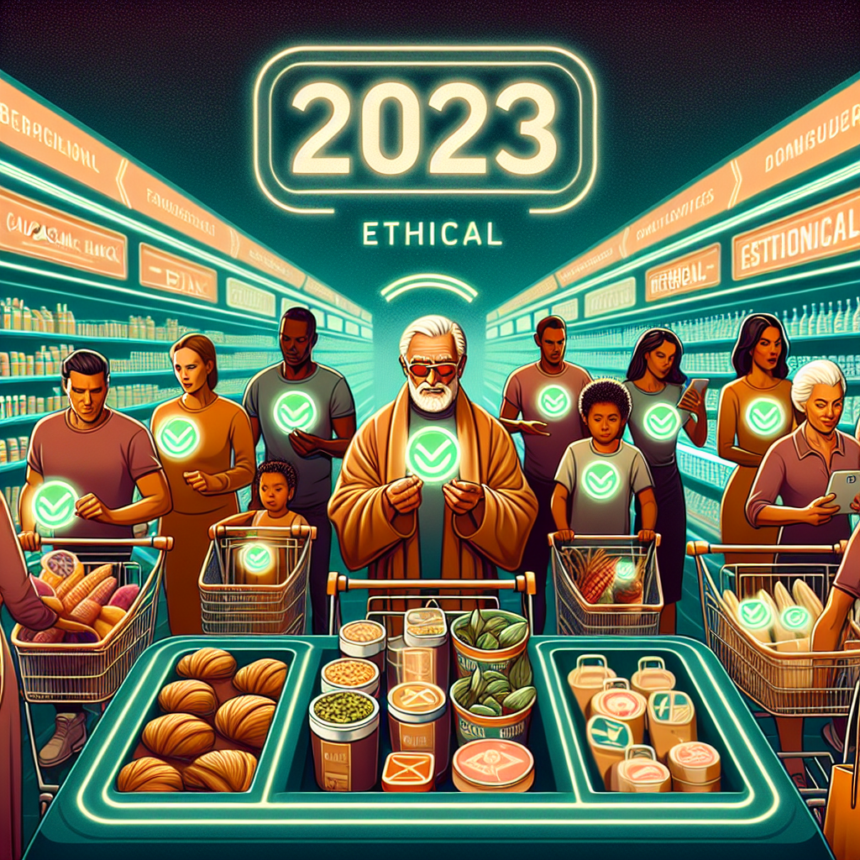Consumer Behavior Shift: The Rise of Ethical Spending in 2023
In recent years, a notable shift has been observed in consumer behavior, particularly towards ethical spending. As we venture deeper into 2023, this trend has only solidified its place in mainstream commerce, reflecting a fundamental change in how individuals view their purchasing decisions. Consumers are increasingly prioritizing ethical considerations alongside quality and price, and this shift has significant implications for businesses, marketing strategies, and the global economy.
Understanding Ethical Spending
Ethical spending, often defined as the practice of purchasing goods and services that are produced and delivered in an environmentally friendly, socially responsible, and sustainable manner, encompasses various factors. Key areas include fair labor practices, minimal environmental impact, animal welfare, and support for local economies. In 2023, this concept is evolving, fueled by consumers’ growing awareness and concern over issues such as climate change, social justice, and labor rights.
The Influencing Factors Behind the Shift
Several catalysts have contributed to the rise of ethical spending in 2023:
-
Increased Awareness: Social media and digital platforms have played a crucial role in raising consciousness about ethical issues. Consumers are more informed than ever about the practices behind their purchases, thanks to viral campaigns, documentaries, and influencer advocacy.
-
Generational Change: Millennials and Gen Z patrons are more inclined to prioritize ethical considerations. They often turn to brands that align with their personal values; as they gain purchasing power, their preferences are shaping market trends.
-
Pandemic Reflection: The COVID-19 pandemic prompted many individuals to reevaluate their lifestyles and buying habits. People have become more mindful of their contributions to society and the environment, leading to a preference for sustainable choices.
-
Corporate Accountability: Businesses are increasingly being held accountable for their practices. Transparency has become an expectation, and consumers are demanding to know the origins of their products and the conditions under which they were made. Brands that fail to demonstrate ethical commitments risk losing market share.
- Legislative Changes: In 2023, stricter regulations are emerging, compelling brands to adopt more sustainable practices. This legislative momentum reflects a growing recognition by governments that ethical consumption is vital for societal and environmental well-being.
The Impact on Businesses
As consumer preferences shift towards ethical spending, businesses must adapt or risk obsolescence. Many companies are finding themselves integrating ethical considerations into their core strategies. Here are some ways businesses are responding:
-
Sustainable Practices: Companies are investing in sustainable sourcing, reducing waste, and minimizing their carbon footprint. They are also working towards certifications that verify their commitments to ethical practices.
-
Transparency Initiatives: Businesses are becoming more transparent about their supply chains and labor practices. Initiatives such as fair trade certifications and sustainable sourcing labels are becoming standard practices.
-
Marketing Strategies: Companies are now weaving ethical narratives into their marketing campaigns. Storytelling about the positive impact of purchases on communities and the environment resonates well with today’s consumers.
- Community Support: More businesses are focusing on supporting local economies, sourcing from small-scale producers, and giving back to communities through corporate social responsibility initiatives.
Future Implications
The rise of ethical spending is not merely a trend; it represents a fundamental transition in consumer culture. As this phenomenon continues to grow, we can expect further evolution in business ethics and practices. Brands that embrace ethical spending will likely experience competitive advantages, while those resistant to change may find themselves sidelined in a rapidly evolving marketplace.
As consumers become more savvy about the implications of their spending, businesses must continue to innovate and adapt. The future of commerce is not only about profitability but sustainability and social responsibility.
FAQs
Q1: What is ethical spending?
A1: Ethical spending refers to the practice of purchasing products and services that are produced in socially responsible and environmentally sustainable ways. This may include considerations for fair trade, local sourcing, and protection of the environment.
Q2: Why is ethical spending important?
A2: Ethical spending helps to support sustainable practices, improve labor conditions, mitigate climate impacts, and promote social justice, contributing to a healthier planet and society.
Q3: How can I make ethical purchasing decisions?
A3: Research brands and their practices, look for certifications like fair trade or organic, support local businesses, and prioritize products with minimal packaging and sustainable materials.
Q4: Are there downsides to ethical spending?
A4: While ethical products can sometimes come at a higher price, the long-term benefits for society and the environment often outweigh the initial costs. Shopping ethically can be more about value rather than mere price.
Q5: Is ethical spending merely a trend?
A5: No, ethical spending represents a significant cultural shift that is likely to continue. As consumer awareness grows, companies that prioritize ethical practices will be more competitive in the market.










